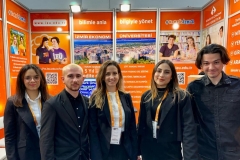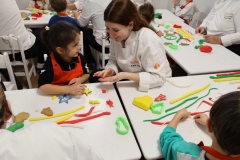
SCHOOL OF APPLIED MANAGEMENT SCIENCES
Gastronomy and Culinary Arts Program
GEHU 209 | Course Introduction and Application Information
| Course Name |
History of Civilizations I
|
|
Code
|
Semester
|
Theory
(hour/week) |
Application/Lab
(hour/week) |
Local Credits
|
ECTS
|
|
GEHU 209
|
Fall/Spring
|
3
|
0
|
3
|
6
|
| Prerequisites |
None
|
|||||
| Course Language |
English
|
|||||
| Course Type |
Service Course
|
|||||
| Course Level |
First Cycle
|
|||||
| Mode of Delivery | - | |||||
| Teaching Methods and Techniques of the Course | DiscussionQ&ALecture / Presentation | |||||
| Course Coordinator | ||||||
| Course Lecturer(s) | ||||||
| Assistant(s) | - | |||||
| Course Objectives | The basic purpose of this course is to acquaint students with the basic evolutionary developments in the History of Western Civiliziaitons and to enable them to analyze these developments, through a comparative perspective, in the economic, sociopolitical, cultural and scientific field for understanding the dynamics of the modern world. |
| Learning Outcomes |
The students who succeeded in this course;
|
| Course Description | the content of the course starts with the Prehistoric Ages and deals with the first civilizations, Ancient Greek and Roman cultural and political developments, the Byzantine Empire and the basic important developments in Europe during the Medieval Age. |
|
|
Core Courses | |
| Major Area Courses | ||
| Supportive Courses | ||
| Media and Management Skills Courses | ||
| Transferable Skill Courses |
WEEKLY SUBJECTS AND RELATED PREPARATION STUDIES
| Week | Subjects | Related Preparation |
| 1 | Introduction to History of Civilizaiton: Discussion on Basic Historical concepts and terms | |
| 2 | Human Evolution From Homo Habilis to Modern Man;Transition From Food Gathering into Food Producing: The First Examples of Sedentarization and Its Socio-Economic Reflections | Robert E. Lerner, et al., Western Civilizaitons, Their History and Their Culture, London, 1998. |
| 3 | Transitional Process to Urbanization with its Economic, Socio-Cultural and Political Dimensions (Mesopotamia) | Robert E. Lerner, et al., Western Civilizaitons, Their History and Their Culture, London, 1998. |
| 4 | Midterm Exam | |
| 5 | Basic Aspects of Religion in Antiquity: Egyptian Polytheism and Hebrew Henothesim | Robert E. Lerner, et al., Western Civilizaitons, Their History and Their Culture, London, 1998. |
| 6 | Ancient Greek World: Political Evolution From Monarch to Democracy; Athens Versus Sparta | Robert E. Lerner, et al., Western Civilizaitons, Their History and Their Culture, London, 1998. |
| 7 | Mythology, Religion and Philosophy in Ancient Greece | Robert E. Lerner, et al., Western Civilizaitons, Their History and Their Culture, London, 1998. |
| 8 | Alexander the Great and Hellenistic Cosmopolitanism | Robert E. Lerner, et al., Western Civilizaitons, Their History and Their Culture, London, 1998. |
| 9 | Midterm Exam | |
| 10 | Rome in Antiquity: From Rebublic to Empire | Robert E. Lerner, et al., Western Civilizaitons, Their History and Their Culture, London, 1998. |
| 11 | Rome in Antiquity: Culture, Society and Law | Robert E. Lerner, et al., Western Civilizaitons, Their History and Their Culture, London, 1998. |
| 12 | Emergence and Triumph of Christianity | Robert E. Lerner, et al., Western Civilizaitons, Their History and Their Culture, London, 1998. |
| 13 | Eastern Rome and the West | Robert E. Lerner, et al., Western Civilizaitons, Their History and Their Culture, London, 1998. |
| 14 | Byzantine Empire with its Social, Economic and Political Institutions | Robert E. Lerner, et al., Western Civilizaitons, Their History and Their Culture, London, 1998. |
| 15 | Shaping of the Christian West | Robert E. Lerner, et al., Western Civilizaitons, Their History and Their Culture, London, 1998. |
| 16 | Final exam |
| Course Notes/Textbooks | the related chapters of the books mentioned |
| Suggested Readings/Materials |
EVALUATION SYSTEM
| Semester Activities | Number | Weigthing |
| Participation | ||
| Laboratory / Application | ||
| Field Work | ||
| Quizzes / Studio Critiques | ||
| Portfolio | ||
| Homework / Assignments | ||
| Presentation / Jury | ||
| Project | ||
| Seminar / Workshop | ||
| Oral Exams | ||
| Midterm |
2
|
60
|
| Final Exam |
1
|
40
|
| Total |
| Weighting of Semester Activities on the Final Grade |
2
|
40
|
| Weighting of End-of-Semester Activities on the Final Grade |
1
|
60
|
| Total |
ECTS / WORKLOAD TABLE
| Semester Activities | Number | Duration (Hours) | Workload |
|---|---|---|---|
| Theoretical Course Hours (Including exam week: 16 x total hours) |
16
|
3
|
48
|
| Laboratory / Application Hours (Including exam week: '.16.' x total hours) |
16
|
0
|
|
| Study Hours Out of Class |
16
|
4
|
64
|
| Field Work |
0
|
||
| Quizzes / Studio Critiques |
0
|
||
| Portfolio |
0
|
||
| Homework / Assignments |
0
|
||
| Presentation / Jury |
0
|
||
| Project |
0
|
||
| Seminar / Workshop |
0
|
||
| Oral Exam |
0
|
||
| Midterms |
2
|
19
|
38
|
| Final Exam |
1
|
30
|
30
|
| Total |
180
|
COURSE LEARNING OUTCOMES AND PROGRAM QUALIFICATIONS RELATIONSHIP
|
#
|
Program Competencies/Outcomes |
* Contribution Level
|
||||
|
1
|
2
|
3
|
4
|
5
|
||
| 1 | Successfully applies theoretical and practical knowledge and skills in Gastronomy and Culinary Arts |
|||||
| 2 | Carries best practices in terms of work and food security, safety and hygiene in food production |
|||||
| 3 | Appreciates, evaluates and makes decisions regarding to visual, textual and nutritional data with respect to food production and presentation |
|||||
| 4 | Recognizes and evaluates the impact of gastronomy on culture and society |
|||||
| 5 | Assumes responsibility for solving complex problems that may occur in the field of Gastronomy and Culinary Arts, both individually and as a team member |
|||||
| 6 | Evaluates the knowledge and skills acquired in the field of Gastronomy and Culinary Arts with a critical approach and effectively communicate their ideas and suggestions for solutions in written and oral form. |
|||||
| 7 | Possesses necessary knowledge and skills in relevant fields such as gastronomy, design, law and management and effectively apply them to the practice of Culinary Arts |
|||||
| 8 | Uses the technological tools related to Gastronomy and Culinary Arts effectively |
|||||
| 9 | Updates and improve the knowledge, skills and competencies related to Gastronomy and Culinary Arts with lifelong learning awareness and sustainability with an ethical approach |
|||||
| 10 | Collects data in the areas of Gastronomy and Culinary Arts and communicate with colleagues in a foreign language. (European Language Portfolio Global Scale”, Level B1) |
|||||
| 11 | Speaks a second foreign at a medium level of fluency efficiently |
|||||
| 12 | Relates the knowledge gained through the history of humanity to the field of expertise |
|||||
*1 Lowest, 2 Low, 3 Average, 4 High, 5 Highest
NEWS |ALL NEWS
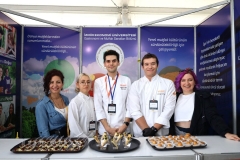
Aegean flavors from the chefs of the future
Izmir University of Economics (IUE) Department of Gastronomy and Culinary Arts left its mark on the 6th Izmir GastroFest, organized this year with
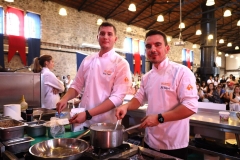
They added flavor to GURMEFEST
GURMEFEST, one of the biggest food, drink and entertainment festivals of Izmir, was ‘flavored’ with the dishes prepared and presented by the

“Izmir and Bodrum will class up”
The MICHELIN Guide, one of the most prestigious restaurant rating systems in the world, has added Izmir and Bodrum to its Turkish
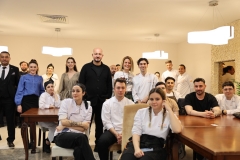
IUE graduates will prepare the flavors unique to Turkish cuisine
Bilsev Group, who is preparing to expand to Dubai this year with its Ferdi Baba, Fabrice Restaurant and Baba Pizza brands, will
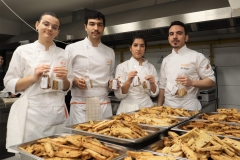
They prepared products that are filling and have a long shelf life
25 students of Department of Gastronomy and Culinary Arts of Izmir University of Economics (IUE) prepared products with a long shelf life,



